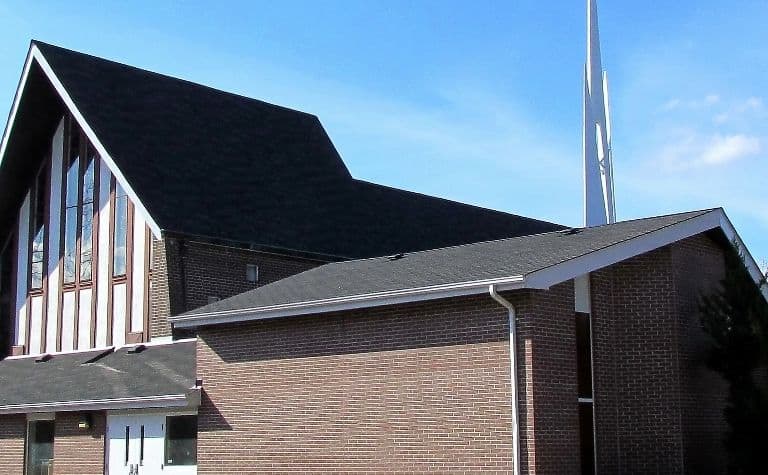Presbyterians disagree with Catholics on several vital issues. For example, Presbyterians don’t recognize the papacy, have different beliefs about the saints, including Mary, and have different views about the Lord’s Supper or Eucharist. These differences make some wonder if a Catholic can attend a Presbyterian church.
Catholics may attend Presbyterian churches, most of which would receive them in a kind and friendly manner. Catholics may not, however, participate in communion, become a member, or serve in leadership or teaching roles because they don’t subscribe to Presbyterian theology and practice.
Why can’t Catholics participate in communion, be members, or serve in specific capacities in Presbyterian churches? What do Presbyterians and Catholics agree about? What do they disagree about? Keep reading to learn more.
Also, see Presbyterian vs. Pentecostal: What’s the Difference? to learn more.

Do Presbyterian Churches Welcome Visitors?
It’s essential to distinguish between attending a Presbyterian church and being a member of one. Catholics, non-Presbyterian Protestant Christians, and even atheists may visit Presbyterian churches any Sunday they desire. (Also see Presbyterian Church USA vs. Presbyterian Church in America: What’s the Difference?)
However, membership in a Presbyterian church involves agreeing to belief statements and living according to a biblically-based code of conduct.
- Can anyone attend a Presbyterian church? Yes. Most Presbyterian churches are hospitable and kind to visitors, including Catholics. There may be a few churches that aren’t nice to new people, but their rudeness has nothing to do with Presbyterianism, per se. A non-Presbyterian can attend a Presbyterian church, develop friendships, and even participate in specific ministries.
- Can anyone become a member of a Presbyterian church? Historically, membership is open to everyone but not to every belief system or worldview. Anyone can be a member of a Presbyterian church, no matter their race, gender, or social standing, but if they aren’t theologically like-minded, the church will deny their membership. In addition to theological agreement, baptism is essential to Presbyterian church membership.
- Why would a Catholic want to attend a Presbyterian church? A Catholic may wish to attend a Presbyterian church out of interest or curiosity. However, many times a Catholic knows someone in the church. They may have a family member or friend they want to support, like an infant’s baptism or a couple’s wedding. Loved ones may also want to be together for Christmas or Easter. (Also see Presbyterian vs. Roman Catholic: What’s the Difference?)

Why Can’t Catholics Be Members of Presbyterian Churches?
Presbyterians, like Catholic churches, require would-be members to adhere to certain doctrines and moral behaviors. Catholics may meet ethical standards, but if they are devoted to the Catholic church’s teachings, they won’t align with Presbyterian doctrine on important matters of the faith.
- Membership includes participation in church decisions: Members have a say (though not necessarily the final say) in a church’s decisions. Members are influential regarding the church’s ministry vision, financial stewardship, and election of church leaders, including hiring pastors and ministers. (Also see Presbyterian vs. Protestant: What’s the Difference?)
- Membership includes an invitation to baptism and the Lord’s Supper: The possibility of membership in a Presbyterian church involves baptism. A person must be baptized for membership consideration. Membership also includes the opportunity to receive the Lord’s Supper. Catholics and Presbyterians have important differences regarding what happens when the bread and cup are consumed (see below).
- Membership includes the leadership opportunity: When churches elect leaders (e.g., elders), they choose from among the members because the church has already vetted them for doctrinal agreement and behavioral standards. Leaders must share the convictions of the denomination to ensure unity and effectiveness in ministry.
- Membership may include state or federal compliance: If a church’s incorporation documents list the requirements for membership, like a constitution, they must adhere to them or be at risk of a government audit. Findings of non-compliance could result in a church having its non-profit status removed. (Also see Are Presbyterians Calvinists?)

Catholic vs. Presbyterian Comparison Chart
| Presbyterianism | Roman Catholicism |
|---|---|
| Authority: No Presbyterian (or Protestant) denomination or church recognizes the Pope as the Vicar of Christ or head of the Church. Leaders in the Presbyterian tradition serve under the authority of Scripture, not Scripture plus church tradition. | Authority: Catholicism teaches that the Pope is the Vicar (i.e. representative or deputy) of Christ and the head of the Church on Earth, which is an office that finds its origin in the ministry of the Apostle Peter. |
| Sacraments: Usually referred to as “sacraments,” there are only two: baptism (infant and adult) and the Lord’s Supper. Presbyterians don’t believe sacraments are channels of God’s grace. | Ordinances: Catholic teaching refers to these practices as “ordinances”: adult and infant baptism, confirmation, the Eucharist, penance, anointing, ordination, and marriage. These practices are channels of God’s grace, according to Catholic theology. |
| Infant baptism: Presbyterians are “paedobaptists,” paedo = “child (not all Protestants are). Baptism signifies inclusion into the Covenant community. | Infant baptism: Also called “paedobaptism,” children of Christian parents are baptized to cleanse them of original sin and regenerate them. |
| The Lord’s Supper: Also called “communion,” Presbyterians don’t believe the elements become the literal body and blood of Christ but hold that he is spiritually present in the bread and cup. | The Lord’s Supper: Also called “the Eucharist,” it is a memorial in which the elements of the bread and cup become the body and blood of Christ (i.e. “transubstantiation”). |
| Saints: Presbyterians, like other Protestants, believe the word “saints” (e.g., 1 Cor. 1:2) in the New Testament refers to Christians in general. They don’t believe in canonizing believers but honor and value their service to God and the Church. | Saints: In Catholic teaching, believers who have lived with great virtue and honor may be considered for canonization after physical death. Believers who are still living on Earth venerate the saints in part by asking them for prayer and blessings. |
| Mary: Mary, the mother of Jesus, is to be respected, honored, and seen as an example of obedience, holiness, devotion, and love. She was, however, a sinner like all other people. She was neither a perpetual virgin nor was she raptured to heaven. People should not pray to her, and Christ should be considered the only mediator between God and people. | Mary: Catholicism teaches that Mary, referred to as “the Mother of God,” was virgin born, lived a sinless life, reversed Eve’s disobedience, was a perpetual virgin, was raptured to heaven, and is an advocate and co-mediator. |
| Religious orders: The Presbyterian tradition doesn’t include religious orders, however, clergy or laity may sense God’s call for them to be single or live minimally. | Religious orders: The term describes men (e.g., priests) and women (e.g., nuns) who have fully devoted themselves to a certain form of religious life, which includes poverty, chastity, and obedience. |
Also, see What’s the Difference Between Presbyterian and Evangelical? to learn more.
The Catholic Church teaches that the bread and cup literally turn into the body and blood of Christ: “The most August sacrament is the Most Holy Eucharist in which Christ the Lord himself is contained, offered, and received and by which the Church continually lives and grows.”
It continues, “The eucharistic sacrifice, the memorial of the death and resurrection of the Lord, in which the sacrifice of the cross is perpetuated through the ages is the summit and source of all worship and Christian life, which signifies and effects the unity of the People of God and brings about the building up of the body of Christ.” (Canon 897) [2]
The Westminster Confession of Faith of 1647, which articulate the beliefs of the Presbyterian tradition, calls transubstantiation repugnant:
“That doctrine which maintains a change of the substance of bread and wine, into the substance of Christ’s body and blood (commonly called transubstantiation) by [the] consecration of a priest, or by any other way, is repugnant, not to Scripture alone, but even to common sense, and reason; overthroweth the nature of the sacrament, and hath been, and is, the cause of manifold superstitions; yea, of gross idolatries, (Act 3:21; 1Co 11:24-26; Luk 24:26).”
Also see: Presbyterians vs. Puritans: What’s the Difference?
References:
[1] Source
[2] Source
[3] Source
Related Questions
The Presbyterian and Episcopalian traditions are Protestant branches of the Christian faith that originated in 16th-century Europe. These denominations have much in common, especially when contrasted...
The Roman Catholic and Presbyterian branches of the Christian faith trace their origins to Jesus of Nazareth and his apostles, as well as their writings that comprise most of the New Testament. There...
